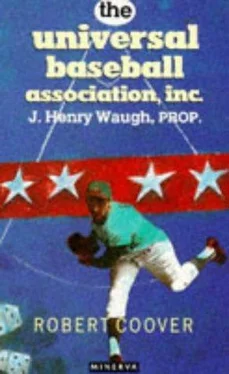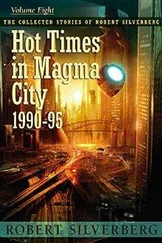Of course, Henry, in his condition, had only one available strategy for the day, and that was to bluff with his empty hand. He had nothing left but will power, and was running short of that. He pursued methodically each ritual, the hanging up of his coat and hat, the gathering and sorting of ledgers, the sharpening of pencils and filling of pens, the shuffling of drawers, clearing of throat, opening of books, search for eraser, stroking of jaw, loosening of collar, adjusting of self in chair, inspection of faulty penpoint, replacement thereof: all for a gain of seventeen minutes out of a total day's play of seven-and-a-half hours. You're not going to make it, boy, he advised himself and winced as though trying to read an illegible entry in the book open before him… and it was illegible, he couldn't see a thing.
He opened the drawer to search for his magnifying glass, came upon his horseracing game in a set of manila file folders. When last he'd played it, there'd been a three-year-old named Ramshorn causing a sensation, though the big horses were still Saturday's Exile and Portent. Yes, and there was Muffin and Saddlepoint and Annie Oakley: he flicked hastily through the folders, waking up a little. Jacinto Abril, who'd tried and failed as a UBA ballplayer, was developing into one of the greatest jockeys of all time. Henry glanced around: heads down and working. Well, it was a temptation. But no, not yet. Had to get some work done first. Ziff would be watching him this morning. Save it for the afternoon. Need it more then anyway.
He turned back to the journal he'd opened. Who was it? Meo Roth's Skylight Protection Company: Repairs, Waterproofing, Replacement, and Screening. A sad case, because the firm was dying. Purchases had dwindled to almost nothing; inventory was constant, but through obsolescence, had become a storage liability rather than an asset; gross trading profit had sunk below selling, administrative, and general expenses; and, on top of it all, there were rents, mortgage payments, and taxes to be paid out. Old Meo Roth was reeling toward the ruin level. "Join the company," Henry said, then glanced up guiltily; a head or two turned his way briefly. He cleared his throat and lipped a few numbers to cover what was becoming an incurable and stupid habit.
Exit from competition: true, that was both his prospect and his problem. Roth had a bin full of glass and junk that was only costing him money to keep; Henry had a kitchen full of heroes and history, and after heavy investment, his corporate account had suddenly sunk to zero. Accretion of wasting assets. No flexibility. Roth had blundered in his inventory scheduling: if he could dump that glass and steal a load of plastic or fiberglass skydomes, he still might, with drive and imagination, make it. But what was Henry's solution? There must be a way, he thought — but then he remembered that absurd ball game back on the table that the bad guys were winning, 18-to—1. What did he mean, "bad guys"? Because, damn it, they killed the kid. And it was the kid who'd brought new interest, new value, a sense of profit, to the game. You mean, things were sort of running down before…? Yes, that was probably true: he'd already been slowly buckling under to a kind of long-run market vulnerability, the kind that had killed off complex games of his in the past. What had happened the last four or five league years? Not much. And then Damon had come along to light things up again. And maybe that was it: Casey had put out the light and everybody was playing in the dark. An 18-to-1 ball game, they must be playing in the dark! He watched them down there, playing in the dark, running around, tripping over bases, there in the dark, wallowing around in heaps of paper, spilling off the table edge—
He jerked his head up so fast, he got a crick in his neck. He rubbed it, peeking around at the others, but afraid to look over toward Zifferblatt's office. He took some deep gulps of air, flexed his fingers, stretched his legs under the desk, con-centrated on the figures. The clock on the wall, which somehow in its fat white roundness and hard black numbers always reminded Henry of Horace Zifferblatt himself, told him: thirty minutes down, seven hours to go. He sighed. Don't think about the whole day, that'll kill you, just try to make it to lunch break. One inning at a time. But he was beginning to get pretty nauseous, which the idea of lunch only aggravated. He rubbed his neck, and with extreme concentration, managed to post his first entry of the day. Shaky, but legible. In the right place, too, he was sure of it. He smiled at his victory.
But five minutes later, he was snoring on the books. So loud he could hear himself. When Zifferblatt woke him by a violent shaking of the ledgers under his face, he was dreaming he had just signed a contract with old Meo Roth that would save the firm and his own as well, and Roth/Ziff had tears of gratitude in his eyes. "That's all right," Henry said, rearing up, "think nothing of it."
Bulging above Henry's desk, thick thumbs rammed in his belt, face white with astonishment and rage, and this time it was no act, certainly not, choking as though he'd just swallowed something big and heavy as a headstone, Zifferblatt was able only to open his mouth and close it. He jerked his jowls in the general direction of his office. Henry rose and followed. Watched by all.
Even in his office, Zifferblatt could not find his voice. He sat down abruptly behind his desk, glared once at Henry, then pulled out the company checkbook, proceeded to write out a check, his dewlaps and chins aquiver with energy and conviction.
"I'm sorry, Mr. Zifferblatt," Henry said. "I haven't been getting much sleep."
"I can understand personal problems," Zifferblatt sputtered, "but — but to disturb an entire office!"
"I know. It's inexcusable. I shouldn't have come today."
Zifferblatt grunted, worked his soft mouth back and forth, stared down at the check he had just written out, then dropped it on the desk in front of him and leaned back in his swivel chair. "Sit down, Mr. Waugh." Books with blood-red or pale green backs lined every wall but the one behind Zifferblatt's head. That one was hung with diplomas, certificates, photographs, mottos, clippings, charts, clocks, travel souvenirs, and a map of the city on which a red blot pierced by a green arrow indicated the house of DZ&Z. Under black-bordered photos of the late lamented Abe Zauber and Marty Dunkelmann, the inscription: They are with us still. "A young man, Mr. Engel said."
"Yes."
"An athlete."
"Yes, a baseball pitcher."
"Oh yes, baseball." Zifferblatt pressed bis stiff spatulate thumbs together over his round belly and pursed his lips as though to blow a kiss or spit. "The great American game." He paused, smiled — or perhaps it was only a gas pain, a tic just below the nose: "After business, of course." The pictures of his children were all taken in infancy… as though he hadn't let them live past that. "And, tell me, what do both baseball and business need, Mr. Waugh?"
"Somebody to keep the books."
"Well, humph, yes, but I was going to say hard playing, and above all, teamwork! " He socked his padded palm with a rolled fist, then squeaked forward in his chair. His eye fell on the check; he tore it up, saying: "One member not pulling his share, and the whole operation can be forced to liquidate. A lot of individual stars aren't enough, you've got to have organization and discipline, as well. You do see that, don't you, Mr. Waugh?" Henry nodded, though the movement intensified his headache and the crick in his neck. Ziff stood to make a point: "You're a man now of mature years, forty, fifty—"
"Fifty-six."
"Fifty-six! Nine years from retirement! And I'm asking you, do you wish to keep your job here, or do you not? "
Читать дальше












